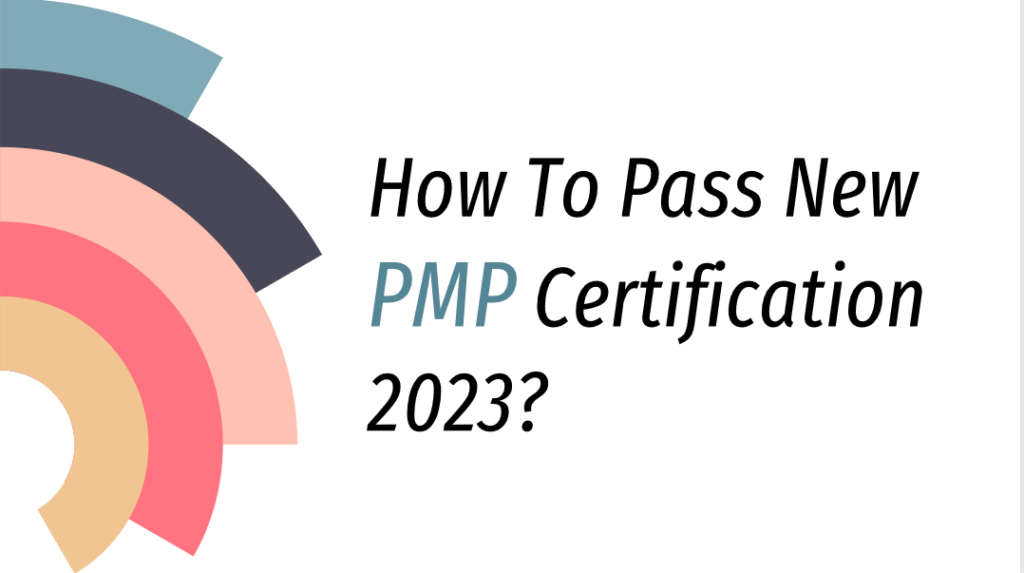How To Pass New PMP Certification 2023?
The Project Management Professional (PMP) certification is the most well-recognized. With a PMP certification, a Project Manager has the distinction of a globally recognized professional credential, and the verifiable knowledge to manage projects more efficiently. We will discuss how to pass the new PMP exam 2023 below.
What is PMP Certification?
Earning Project Management Institute (PMI)’s Project Management Professional (PMP) certification is an important step in your project management career. It is a challenging process, but having a PMP certification can open career opportunities leading to increased earning potential. PMI manages the PMP certification exam as part of global standards for the profession of project management. PMI produces A Guide to the Project Management Body of Knowledge (PMBOK Guide), a global standard for all things project management and a foundation for the PMP certification. Project Management Academy has everything you need to understand the PMP exam requirements and the process for applying for the PMP Certification so that you can start advancing your career today!

What are the requirements for the PMP certification?
To be eligible for the PMP certification, you need to meet the following criteria:
- A four-year degree (bachelor’s or equivalent) and at least three years of project management experience, with 4,500 hours leading and directing projects and 35 hours of project management education.
- OR
- A high school diploma (or equivalent) and at least five years of project management experience, with 7,500 hours leading and directing projects and 35 hours of project management education.
You also need to agree to abide by the PMI Code of Ethics and Professional Conduct and pass a background check.
How much does the PMP certification cost?
The PMP certification fee depends on your PMI membership status. If you are a PMI member, you can take the exam for $405. If you are not a PMI member, you have to pay $555. The PMI membership fee is $139 for the first year and $129 for subsequent years. You can also get discounts if you join a local PMI chapter.
Besides the exam fee, you also need to consider the costs of study materials, courses, mock exams, and other resources. These can vary depending on your preferences and needs, but you can expect to spend at least $300-$500 on them.
What are the benefits of the PMP certification?
The PMP certification can bring you many benefits, such as:
- Enhancing your credibility and reputation as a project manager
- Demonstrating your commitment and competence in project management
- Increasing your chances of getting hired, promoted, or assigned to more challenging projects
- Expanding your network and opportunities within the global project management community
- Boosting your confidence and satisfaction in your career
- Earning more money and recognition for your work
To prepare for the PMP exam, you need to follow these steps:
- Review the PMP Handbook and Exam Content Outline to understand the exam structure, format, policies, and procedures.
- Apply for the PMP certification online through the PMI website. You will need to provide information about your education, experience, and contact hours. You will also need to pay the exam fee and schedule your exam date and location.
- Study for the exam using various resources such as books, courses, podcasts, videos, blogs, forums, etc. You can also join a study group or hire a coach or mentor to help you with your preparation.
- Take practice tests and mock exams to assess your readiness and identify your strengths and weaknesses. You can find many free and paid online sources for practice questions and simulations.
- Review your results and feedback from the practice tests and mock exams. Focus on improving your weak areas and reinforcing your strong ones. You can also use flashcards, mnemonics, formulas, charts, diagrams, etc. to memorize key concepts and terms.
- Revise your study plan and schedule according to your progress and performance. Make sure you allocate enough time for each domain and topic. You can also use a study planner or tracker tool to monitor your activities and goals.
- Relax and rest before the exam day. Avoid cramming or studying too much in the last few days. Eat well, sleep well, exercise well, meditate well, etc. You can also do some light review or revision to keep your mind fresh and sharp.
Frequently Asked Questions (FAQs):
- Is it hard to pass the PMP exam?
The PMP exam is designed to test your knowledge and ability in project management. The test will be hard if you do not have sufficient experience in project management and have not prepared enough for the PMP exam. - What is the pass rate for the PMP exam?
There is no pass percentage for PMP exams. The pass percentage is decided based on how difficult the exam is. For a difficult exam the pass percentage is reduced and for an easier exam the pass percentage is increased. - Is it easy to clear PMP exam?
It is not easy to clear the PMP exam, it is 230 minutes long and includes 180 questions. To clear the PMP exam you will need to prepare consistently for a few months. If you are experienced in project management and very familiar with all the major concepts in project management, you may find the exam to be easier than it is for the rest.


LEAVE A COMMENT